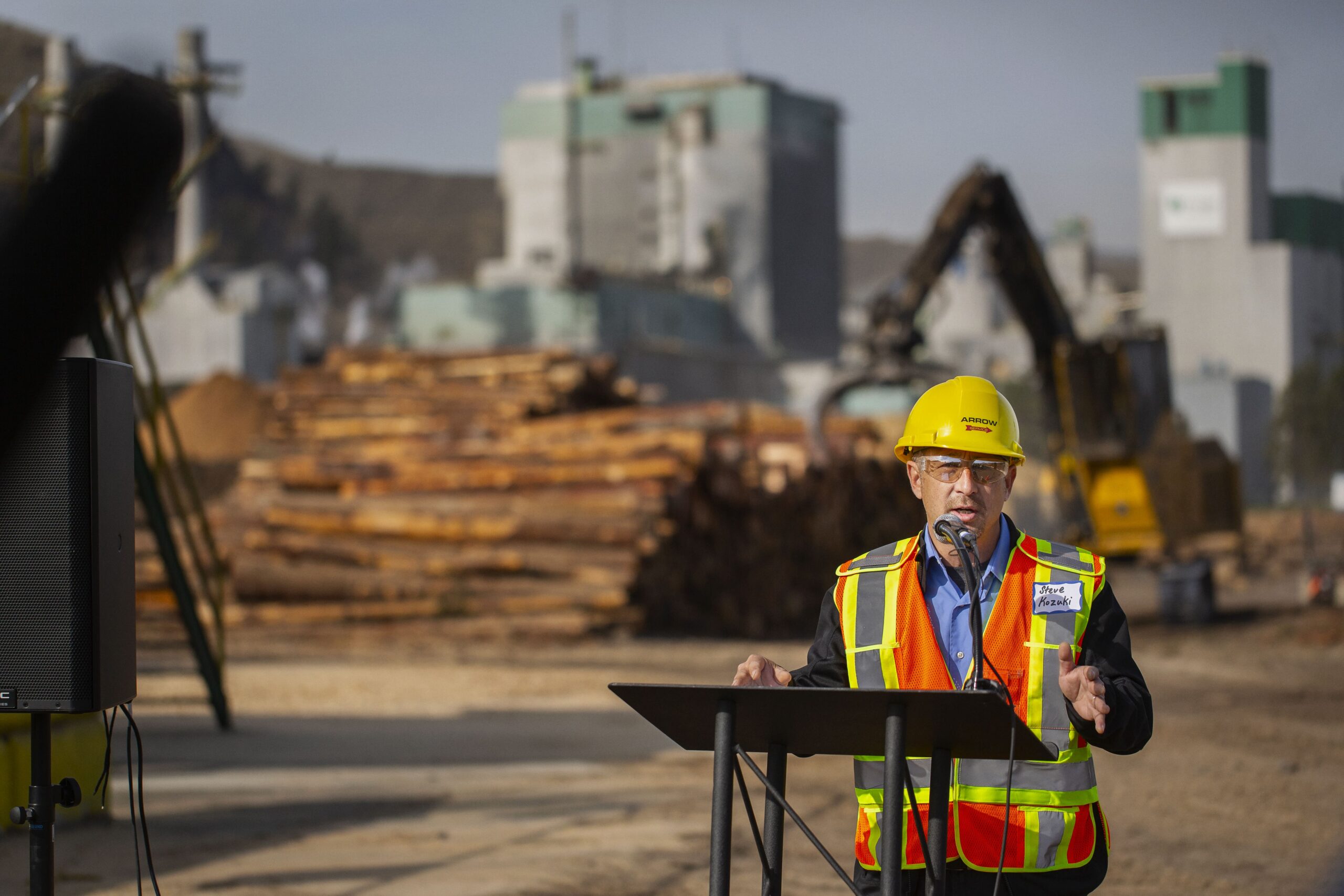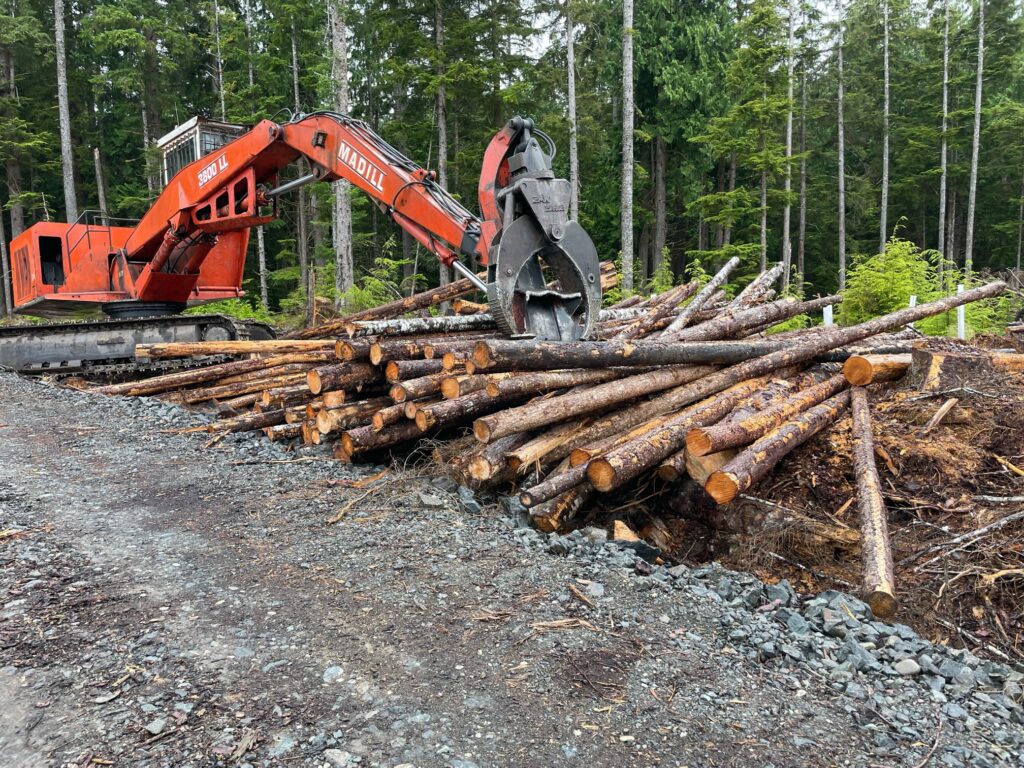Forestry Projects to Help Utilize Waste Wood or Mitigate Wildfire Risk
At a press event in Kamloops, the executive director of the Forest Enhancement Society of BC (FESBC), Steve Kozuki, announced 42 newly funded forest enhancement projects. These projects throughout the province of B.C. will either assist with the delivery of uneconomic forest fibre to pulp and pellet mills or green energy facilities, or will help communities reduce their wildfire risk. Among these projects, nine projects are located in the West Coast region.

“The funding provided by the Forest Enhancement Society of BC is a testament to the Government of British Columbia’s drive to foster environmental sustainability and community wildfire risk reduction. Their support of these transformative projects demonstrates their commitment to helping communities reduce their risk of catastrophic wildfire events and transforming waste wood into green energy and sustainable products. They are taking action on climate change while at the same time promoting job growth and community resiliency throughout our province,” said Kozuki.
These newly funded projects come as a result of the $50 million given to FESBC earlier this year by the Ministry of Forests to boost fibre supply by utilizing uneconomic fibre and reduce wildfire risk while also supporting workers and communities.
“Our forests have endured some very difficult years of late. Devastating wildfires, pine beetle epidemics and the effects of climate change have stressed the environment more than ever before, with direct impacts felt by rural and First Nations communities,” said Bruce Ralston, Minister of Forests. “By using burned or damaged wood, projects around B.C. are providing the forest industry with fibre and are actively increasing our resilience to future wildfires.”

The nine projects in the West Coast region are:
- Haida Gwaii Fibre Utilization: $195,093 in FESBC funding to transport low value pulp logs located on Haida Gwaii by barge to Husby Forest Products on the South Coast.
- Kvamua Forestry Services Ltd. – Sandell Phase 3: $377,127 in FESBC funding to transport pulp logs from the North Coast to pulp mills on the South Coast.
- Kitasoo First Nation-Pooley Island: $319,199 in FESBC funding to transport low value logs from a remote coastal location to southern pulp mills.
- Taan Forest -Incremental Haul: $862,395 in FESBC funding to transport low value pulp logs located on Haida Gwaii by barge to pulp mills on the South Coast.
- CRIBCO Forest Products Ltd. – Heydon Bay: $87,075 in FESBC funding to transport pulp logs from the mainland coast and outside the Fibre Recovery Zone to pulp mills on the South Coast.
- Fibre Salvaging – North Vancouver Island: $646,680 in FESBC funding to collect waste wood outside the Fibre Recovery Zone to be transported to the Atli chip facility at Beaver Cove, processed and then towed to pulp mills on the South Coast.
- Sqomish Forestry LP. Blocks: 51-28; E23; 50-73 project: $150,470 in FESBC funding to transport pulp logs from the mainland coast and outside the Fibre Recovery Zone to pulp mills on the South Coast.
- A&A Trading Ltd. – HG Moresby Island Incremental Pulp project: $239,523 in FESBC funding to transport pulp logs in Haida Gwaii by barge to pulp mills on the South Coast.
- Fibre Salvaging – TFL North Vancouver Island: $275,178 in FESBC funding to collect waste wood outside the Fibre Recovery Zone to be transported to the Atli chip facility at Beaver Cove, processed and then towed to pulp mills on the South Coast.
These initiatives will utilize waste wood to produce green energy and sustainable products, reducing our reliance on fossil fuels and plastics that have long dominated our everyday lives. Other projects currently funded by FESBC will reduce wildfire risks for communities.
“With challenges such as insect epidemics, devastating wildfires, and the need to conserve old growth and wildlife habitat, it is crucial to find innovative solutions,” said Kozuki. “The declining timber supply has amplified the importance of utilizing leftover forest fibre that would have otherwise gone to waste.”
Of the 42 new projects funded throughout the province, 24 projects have direct First Nations involvement, while eight have some First Nations involvement.
ADDITIONAL QUOTES:
CRIBCO Forest Products Ltd. – Heydon Bay
Chief Chris Roberts, Wei Wai Kum: “The FESBC Funding will help CRIBCO, a forest company wholly owned by Wei Wai Kum Nation, utilize low-value and low-end pulp material from our remote, high-cost tenures we hold in our Territory. Utilizing this material from the operating areas is an important part of sustainable resource extraction and something that our Nation has been focused on. The funding FESBC is providing CRIBCO is a win-win for CRIBCO and the Nation, and we look forward to additional opportunities of working with FESBC to assist the Nation with innovation in the forest sector to meet our stewardship and sustainability objectives.”
Taan Forest – Incremental Haul
Jeff Mosher, Taan Forest: “FESBC’s incremental haul funding is a game-changer for us. It enables us to harvest and market lower-valued logs that would typically be left behind in Haida Gwaii due to high transportation costs, only to be burned as waste. The majority of these logs will now supply the Howe Sound Paper Excellence Mill, bolstering the pulp production. Moreover, Taan Forest’s Forst Stewardship Council certification ensures that the mill’s customers receive sustainably sourced raw materials. This project not only benefits contractors with increased revenue for moving additional volume but also allows Taan Forest to invest in training and equipment. The extra revenue also enables us to provide additional revenue to contractors to move firewood to local communities, reducing carbon emissions from pile burning. We deeply appreciate the incremental haul funding as it provides more revenue, more product for our customers, and better utilization of the forest resource.”
Fibre Salvaging – TFL North Vancouver Island
Doug Mosher, RPF, Atli Resources LP: “The FESBC funding toward two projects to salvage approximately 55,000 cubic metres of salvageable fibre that would otherwise be left in the forest to burn or rot will support the Northern Vancouver Island Fibre Utilization Project. Removing this material helps decrease the potential for wildfires, carbon dioxide emissions, and ash into the atmosphere. The funding is being used in a joint project between Atli Resources LP and a salvaging contractor, Estero Peak Contracting Ltd. The waste wood fibre from the harvested forests is hauled by Estero Peak Contracting, material that would otherwise be beyond the economic range of the chip plant to a chip plant in Beaver Cove to be converted into chips for pulp and paper and for hog fuel (bark) to be utilized for power generation.
The direct contributions and the economic ripple effect of this funding will provide employment for the salvage company employees, chip plant employees, and indirectly to many other businesses in the North Island.”
Sqomish Forestry LP. Blocks: 51-28; E23; 50-73 project
Maxime Lapine, Forestry Manager, Sqomish Forestry LP.: “Transporting pulp logs efficiently from the forests of British Columbia to the mills is not merely a logistical task; it is a crucial link that nourishes the growth of our economy while sustaining our commitment to environmental stewardship.”
FESBC would like to gratefully acknowledge the financial support of the Province of British Columbia through the Ministry of Forests.
